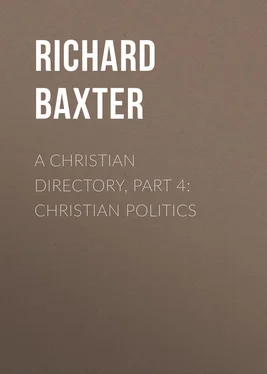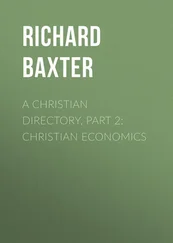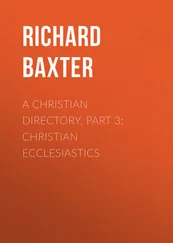Richard Baxter - A Christian Directory, Part 4 - Christian Politics
Здесь есть возможность читать онлайн «Richard Baxter - A Christian Directory, Part 4 - Christian Politics» — ознакомительный отрывок электронной книги совершенно бесплатно, а после прочтения отрывка купить полную версию. В некоторых случаях можно слушать аудио, скачать через торрент в формате fb2 и присутствует краткое содержание. Жанр: foreign_antique, foreign_prose, на английском языке. Описание произведения, (предисловие) а так же отзывы посетителей доступны на портале библиотеки ЛибКат.
- Название:A Christian Directory, Part 4: Christian Politics
- Автор:
- Жанр:
- Год:неизвестен
- ISBN:нет данных
- Рейтинг книги:3 / 5. Голосов: 1
-
Избранное:Добавить в избранное
- Отзывы:
-
Ваша оценка:
- 60
- 1
- 2
- 3
- 4
- 5
A Christian Directory, Part 4: Christian Politics: краткое содержание, описание и аннотация
Предлагаем к чтению аннотацию, описание, краткое содержание или предисловие (зависит от того, что написал сам автор книги «A Christian Directory, Part 4: Christian Politics»). Если вы не нашли необходимую информацию о книге — напишите в комментариях, мы постараемся отыскать её.
A Christian Directory, Part 4: Christian Politics — читать онлайн ознакомительный отрывок
Ниже представлен текст книги, разбитый по страницам. Система сохранения места последней прочитанной страницы, позволяет с удобством читать онлайн бесплатно книгу «A Christian Directory, Part 4: Christian Politics», без необходимости каждый раз заново искать на чём Вы остановились. Поставьте закладку, и сможете в любой момент перейти на страницу, на которой закончили чтение.
Интервал:
Закладка:
56
Bias interrogatus, quidnam esset difficile? Ferre, inquit, fortiter mutationem rerum in deterius. Laert. p. 55.
57
Phil. iii. 7, 8, 11, 12.
58
Univers. Hist. p. 140. Dicas imperatorem orbis Epictetum, Neronem mancipium: irrisum esse summo fastigio, cum servaret dignus, imperaret indignus; nullumque esse malum, quin aliqua boni gutta cordiatus.
59
Numb. xvi.
60
Psal. xii. 6, 7; Prov. xvi. 18; xix. 13.
61
Matt. vii. 1-3.
62
Object. Si id juris orbis obtineat status religionis erit instabilis; mutato regis animo religio mutabitur. Resp. Unicum hic solatium in Divina est providentia; omnium animos Deus in potestate sua habet; sed speciali quodam modo cor regis in manu Domini. Deus et per bonos et per malos reges opus suum operatur. Interdum tranquillitas, interdum tempestas ecclesiæ utilior. Nempe si pius est qui impepat, si diligens lector sacræ Scripturæ, si assiduus in precibus, si Ecclesiæ Catholicæ reverens, si peritos attente audiens, multum per ilium proficit veritas. Sin distorto est et corrupto judicio, pejus id ipsi cedit quam ecclesiæ. Nam ipsum grave manet judicium regis ecclesiæ, qui ecclesiam inultam non sinet. Grotius de Imper. p. 210. John xviii. 36.
63
Dicunt Stoici, sapientes non modo liberos esse verum et reges: cum sit regnum imperium nemini obnoxium, quod de sapientibus solis asseritur. Statuere enim oportere principem de bonis et malis; hæc autem malorum scire neminem. Similiter ad magistratus, et judicia et oratoriam solos illos idoneos, neminemque malorum. Laert. in Zenone.
64
Eam rempublicam optimam dicunt Stoici, quæ sit mixta ex regno et populari dominatu, optimorumque potentia. Laert. in Zenone.
65
Bad people make bad governors: in most places the people are so wilful and tenacious of their sinful customs, that the best rulers are not able to reform them. Yea many a ruler hath cast off his government, being wearied with mutinous and obstinate people. Plato would not meddle with government in Athens. Quia plebs altis institutis et moribus assueverat. Laert. in Platone. And many other philosophers that were fittest for government, refused it on the same account, through the disobedience of the people.
66
Of these things see my propositions of the difference of the magistrate's and pastor's power to Dr. Lud. Moul.
67
The Rex sacrorum among the Romans, was debarred from exercising any magistracy. Plut. Rom. Quest. 63.
68
See Bilson of Subject. p. 238, 256. Princes only be governors in things and causes ecclesiastical; that is, with the sword. But if you infer, ergo, Bishops be no governors in those things, meaning, no dispensers, guiders, nor directors of those things, your conclusion is larger, &c. So p. 256.
69
It was somewhat far that Carolus Magnus went to be actual guide of all in his chapel in reading even in all their stops, as it is at large declared by Abbas Usperg. Chron. pag. 181.
70
Bishop Bilson, pag. 313. We grant they must rather hazard their lives, than baptize princes which believe not, or distribute the Lord's mysteries to them that repent not, but give wilful and open signification of impiety, &c. Beda Hist. Eccles. lib. ii. c. 5, telleth us, that Melitus bishop of London, (with Justus,) was banished by the heirs of king Sabereth, because he would not give them the sacrament of the Lord's supper, which they would needs have before they were baptized.
71
Bishop Andrews in Tort. Tort. p. 383. Cohibeat Regem Diaconus, si cum indignus sit, idque palam constet, accedat tamen ad sacramentum: cohibeat et medicus si ad noxium quid vel insalubre manum admoveat: cohibeat et equiso inter equitandum adigat equum per locum præruptum, vel solebrosum, cui subsit periculum: etiamne medico? etiamne equisoni suo subjectus rex? Sed de majori potestate loquitur; sed ea, ad rem noxiam procul arcendam. Qua in re charitatis semper potestas est maxima. Here you see what church government is, and how kings are under it, and how not, in Bishop Andrews' sense.
72
Bilson, p. 399, saith, The election of bishops in those days belonged to the people, and not the prince, and though Valens by plain force placed Lucius there, yet might the people lawfully reject him as no bishop, and cleave to Peter their pastor.
73
Too many particular laws about little matters breed contention. Alex. Severus would have distinguished all orders of men by their apparel: sed hoc Ulpiano, et Paulo displicuit; dicentibus plurimum rixarum fore, si faciles essent homines ad injurias. And the emperor yielded to them. Lamprid. in Alex. Severus. Lipsius, ubi leges multæ, ibi lites multæ et vita moresque pravi. Non multæ leges bonos mores faciunt, sed paucæ fideliter servatæ.
74
N. B. Quæ habet Andrews Tort. Tort. p. 310. Quando et apud vos dictio juris exterior, clavis proprie non sit: eamque vos multis sæpe mandatis, qui liacorum in sorte sunt, exortes sane sacri ordinis universi.
75
Lege Epist. Caroli Calvi ad Papam inter Hinc mari Rhemensis Epistolas Cont. Papæ Usurpationes. Isidor. Hispal. sent. iii. cap. 51. Cognoscant principes seculi, Deo debere se rationem reddere propter ecclesiam quam a Christo tuendam suspiciunt. Nam sive augeatur pax et disciplina ecclesiæ per fideles principes, sive solvatur, ille ab eis rationem exigit, qui eorum potestati suam ecclesiam credidit. Leo Epist. ad Leonem Imp. Debes incunctantur advertere, regiam potestatem, tibi non solum ad mundi regimen, sed maxime ad ecclesiæ præsidium esse collatam. See the judgment of Jo. Parisiensis, Franciscus Victoria, and Widdrington in Grot. de Imper. pag. 23. Lege Lud. Molinæi Discourse of the Powers of the Cardinal Chigi.
76
Perjurii pœna divina exitium, humana dedecus. Cicero. Agesilaus sent thanks to his enemies for their perjury, as making then no question of their overthrow. Perjuri numinis contemptores. Plutarch. Theodosius execrabatur cum legisset superbiam dominantium, præcipue perfidos et ingratos. Paul. Diaconus, 1. 2.
77
See the instance of loyalty in Mascelzer against his own brother Gildo (a rebel). Paul. Diacon. lib. iii. initio.
78
Bilson of Subject, p. 236. Princes have no right to call or confirm preachers, but to receive such as be sent of God, and give them liberty for their preaching, and security for their persons: and if princes refuse so to do, God's labourers must go forward with that which is commanded them from heaven; not by disturbing princes from their thrones, nor invading their realms, as your holy father doth, and defendeth he may do; but by mildly submitting themselves to the powers on earth, and meekly suffering for the defence of the truth, what they shall inflict. So he.
79
Prov. xvi. 7.
80
Rom. xiii. 1-4; xi. 36.
81
Si aliquid; jusserit proconsul, aliud jubeat imperator, nunquid dubitatur, illo contempto, illi esse serviendum? Ergo si aliud imperator, aliud jubeat Deus, quid judicatur? Major potestas Deus: da veniam O imperator. August, de Verb. Domin. Matth. Serm. 6.
82
Vetus est verumque dictum, Miser est imperator cui vera reticentur. Grotius de Imp. p. 245. Principi consule non dulciora, sed optima; is one of Solon's sentences in Laert. de Solon. Therefore it is a horrid villany of the Jesuits, which is expressed in Secret. Instruct. in Arcanis Jesuit. p. 5-8, 11. To indulge great men and princes in those opinions and sins which please them, and to be on that side that their liberty requireth to keep their favour to the society. So Maffæinus, 1. iii. c. 11. in vita ipsius Loyolæ. Alexander Severus so greatly hated flatterers, that Lampridius saith, Siquis caput flexisset aut blandius aliquid dixisset, uti adulator, vel abjiciebatur, si loci ejus qualitas pateretur; vel ridebatur ingeuti cachinno, si ejus dignitas graviori subjacere non posset injuriæ Venit ad Attilam post victoriam Marullus poeta ejus temporis egregius, compositumque in adulationem carmen recitavit: in quo ubi Attila per interpretem cognovit se Deum et Divina stirpe ortum vanissime prædicari, aspernatus sacrilegæ adulationis impudentiam, cum autore carmen exuri jusserat. A qua severitate subinde temperavit, ne scriptores cæteri a laudibus ipsius celebrandis terrerentur. Callimach. Exp. in Attila, p. 353.
Читать дальшеИнтервал:
Закладка:
Похожие книги на «A Christian Directory, Part 4: Christian Politics»
Представляем Вашему вниманию похожие книги на «A Christian Directory, Part 4: Christian Politics» списком для выбора. Мы отобрали схожую по названию и смыслу литературу в надежде предоставить читателям больше вариантов отыскать новые, интересные, ещё непрочитанные произведения.
Обсуждение, отзывы о книге «A Christian Directory, Part 4: Christian Politics» и просто собственные мнения читателей. Оставьте ваши комментарии, напишите, что Вы думаете о произведении, его смысле или главных героях. Укажите что конкретно понравилось, а что нет, и почему Вы так считаете.












